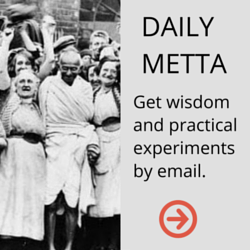June 22:
 “I have come to the fundamental conclusion that if you want something really important to be done, you must not merely satisfy reason, you must move the heart also.”
“I have come to the fundamental conclusion that if you want something really important to be done, you must not merely satisfy reason, you must move the heart also.”
–Gandhi (Young India, October 14, 1926)
Tell a smoker all the good reasons to quit smoking, show them facts and statistics, and watch what happens: nine times out of 10, they will go on smoking. How else can cigarettes even place such information–risk of emphysema, risk of cancer, on their packages and see sales increase? Similarly, tell someone with an alcohol addiction that they are killing themselves. Show them the data to help them to see what that daily pack of beer is doing to them, and see if it helps them to drink any less. The same is true of violence. From a certain perspective–what we call the medical model–violence can be understood as a form of addiction: an activity repeated so many times that the will atrophies and mere satisfaction of that craving takes over. Appeals to reason at a certain stage can have its effect, and we always want to consider the power of the reason to eventually take hold–but it’s not enough. We must, as Gandhi maintains, also appeal to the “heart”, the residence of the will. But the will cannot grow on its own. It requires a vision toward which to work, and an alternative to take it there.
Besides a vision of something more constructive, something do-able, what else does it take to move a heart, especially when we are talking about the context of a nonviolent struggle? As the age-old answer goes: it depends! One suggestion to keep in mind, however, is to “do the unexpected.” When someone is expecting you to come at them with insults and shame, for example, try offering them dignity and fierce compassion. They may not respond at first, and if you are using it as merely a tactic, they may not respond at all. But when it comes from the depths: when we are upholding a higher image of someone because we know it is possible and we are not willing to give up on them, no matter what they do to us, it can have a tremendous impact whose effects are freeing in more ways than one.
Experiment in Nonviolence:
The next time you are faced with opposition from someone, appeal not only to their reason, but to that person’s heart as well.
 Daily Metta 2015, a service of the Metta Center for Nonviolence, is a daily reflection on the strategic and spiritual insights of Mahatma Gandhi in thought, word and deed. As Gandhi called his life an “experiment in truth,” we have included an experiment in nonviolence to accompany each Daily Metta. Check in every day for new inspiration. Each year will be dedicated to another wisdom teacher.
Daily Metta 2015, a service of the Metta Center for Nonviolence, is a daily reflection on the strategic and spiritual insights of Mahatma Gandhi in thought, word and deed. As Gandhi called his life an “experiment in truth,” we have included an experiment in nonviolence to accompany each Daily Metta. Check in every day for new inspiration. Each year will be dedicated to another wisdom teacher.








